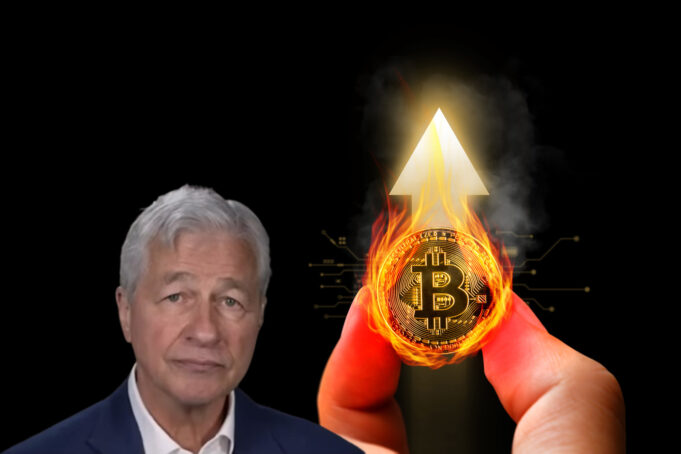JP Morgan CEO Jamie Dimon’s most recent labeling of Bitcoin as a “Ponzi scheme” has reignited discussions within the financial and cryptocurrency communities. It challenges the intersection of traditional banking with digital currencies. Dimon’s assertion raises critical questions about JP Morgan’s ethical and legal standing. This is particularly relevant given its role as an authorized participant in the BlackRock Spot Bitcoin ETF.
The bank finds itself at the center of a provocative thought experiment: If Bitcoin were indeed a Ponzi scheme, could JP Morgan’s engagement implicate it in such an alleged scheme?
The Ethical and Legal Conundrum
Dimon’s critique, while not new, has encouraged a deeper contemplation of the implications of JP Morgan associating with Bitcoin. If Bitcoin were hypothetically a Ponzi scheme, the bank’s participation in the cryptocurrency market could suggest a facilitation of such a scheme, raising significant ethical and legal concerns.
This scenario underlines the paramount importance of due diligence and the ethical imperatives facing banking officials. They are entrusted with the fiduciary duty to act in the best interests of their clients and shareholders.
Promoting a financial instrument like Bitcoin ETFs while JP Morgan’s CEO considers Bitcoin a Ponzi Scheme, tests the integrity of the banking sector. It places its leaders under a microscope for ethical and potentially legal scrutiny.
If you mean crypto like Bitcoin,
I’ve always said it’s a fraud.
…if they think they are a
Jamie Dimon, CEO JP Morgan
currency, there’s no hope for it.
It’s a Ponzi scheme, it’s a public decentralized Ponzi.
Navigating Murky Waters
Jamie Dimon’s latest statement on Bloomberg TV, calling Bitcoin a “Ponzi scheme” raises an interesting dilemma.
The dual nature of JP Morgan’s predicament underscores the complex interplay between finance and cryptocurrency, traversing a landscape filled with legal and ethical gray areas. While the bank’s involvement in the Bitcoin market might be lawful, the ethical ramifications cannot be ignored. This is especially true when engaging with what the CEO believes is a potentially fraudulent scheme. This raises broader considerations about the role of financial institutions in safeguarding the integrity of markets, trades, and financial instruments.
Moreover, the bank’s officers and managers face heightened personal accountability. Directors and Officers (D&O) insurance may offer some financial protection against claims. However, it would not absolve individuals from knowingly participating in ethical breaches or criminal activities. The threat of class action lawsuits, predicated on allegations of misrepresentation or failure to fulfill fiduciary duties, further highlights the significant legal and reputational risks at stake.
Conclusion: The Imperative of Ethical Decision-Making
The controversy stirred by JP Morgan’s CEO Jamie Dimon’s comments extends beyond mere debate. It prompts a critical examination of JP Morgan’s role within the cryptocurrency ecosystem, highlighting the need for transparency, accountability, and ethical scrutiny.
The financial landscape continues to evolve, incorporating digital currencies and blockchain technology. This evolution makes the discourse surrounding JP Morgan’s involvement with Bitcoin a poignant reminder of the intricate dynamics at play. It underscores the importance of ethical vigilance and integrity. This ensures that the traditional financial sector and cryptocurrency world navigate this complex terrain with caution and responsibility.
The question being raised here is not just about Bitcoin. It is about whether banks should sell financial instruments to their clients that their own CEO believes are based on a Ponzi scheme. However, it will be interesting to know Jamie Dimon’s actual thoughts about other financial instruments in JP Morgan’s portfolio.
Read more: Crypto Controversy: BlackRock vs. JPMorgan – Dueling Visions




![Regulatory Impact: Crypto’s [No] Future Under Biden Image depicting two men arm-wrestling. Symbolizing the ongoing struggle of the crypto industry against Biden administration.](https://crispybull.com/wp-content/uploads/2024/05/Crypto_Future_Biden-238x178.jpg)



![Regulatory Impact: Crypto’s [No] Future Under Biden Image depicting two men arm-wrestling. Symbolizing the ongoing struggle of the crypto industry against Biden administration.](https://crispybull.com/wp-content/uploads/2024/05/Crypto_Future_Biden-100x75.jpg)


In the cryptoverse circus, there emerges a figure, a master of manipulation, draped in the cloak of prestige. This individual, wielding their title like a scepter, endeavors to shape the tides of Bitcoin with a mere flick of the wrist, all in the name of “negative influence.” But beneath the facade of altruism lies a darker truth—an insatiable appetite for profit, regardless of the collateral emotional wreckage left in their wake.
As Bitcoin dances to the tune of market fluctuations, this enigmatic persona, perhaps nursing the wounds of their own misguided investments, seeks solace in the art of persuasion. Their words, once heralded as wisdom, now reveal themselves as mere tools in a desperate gambit to reverse the fortunes of a faltering portfolio.
But let us not be fooled by the veneer of benevolence. Behind the scenes, amidst the flurry of tweets and carefully crafted PR campaigns, lurks a parasite, feeding voraciously on the vulnerabilities of the unsuspecting. Humanity and ethics are but distant echoes in the hollow chamber of their conscience, drowned out by the cacophony of profit margins and market dominance.
In this surreal theater of greed and manipulation, such characters stand as monuments to the darker side of human nature—a cautionary tale of unchecked ambition and moral bankruptcy. As the curtains draw to a close on yet another act of crypto drama, one can only wonder: who will be the next to fall prey to the allure of easy riches and the empty promises of a charismatic charlatan?